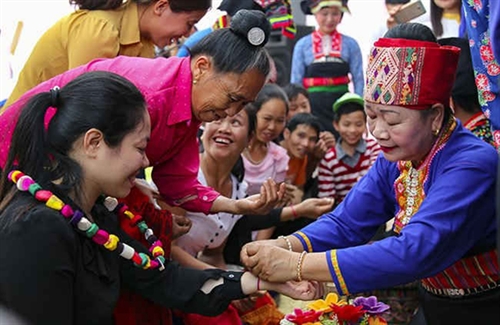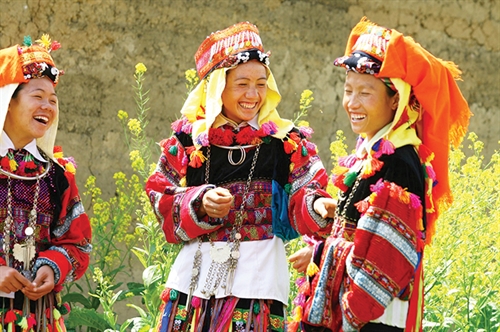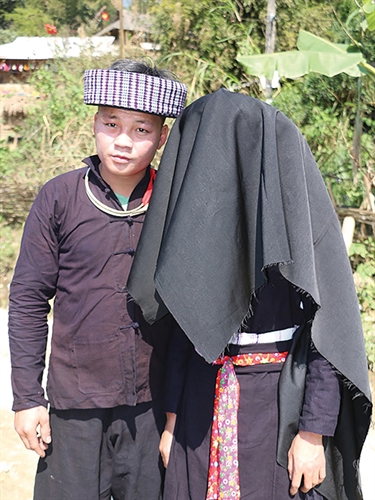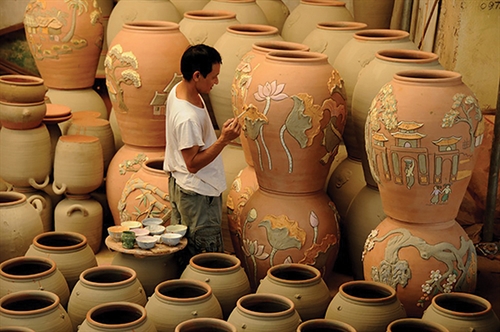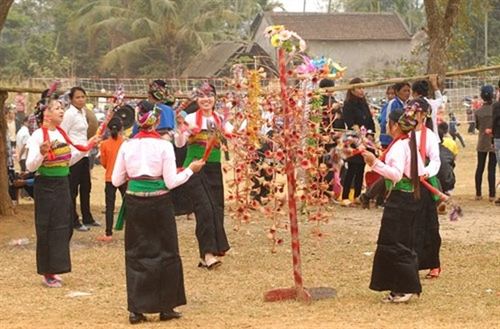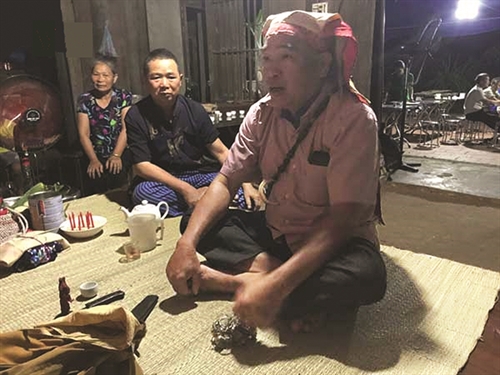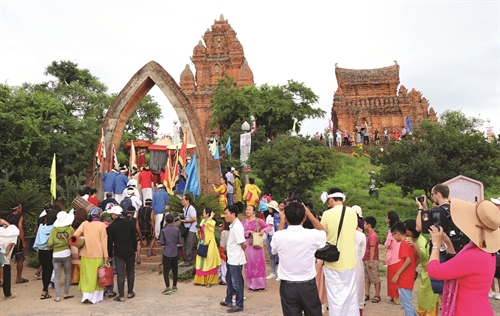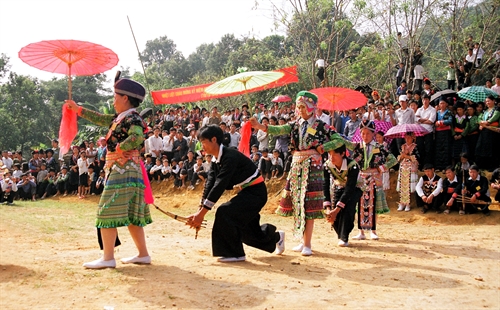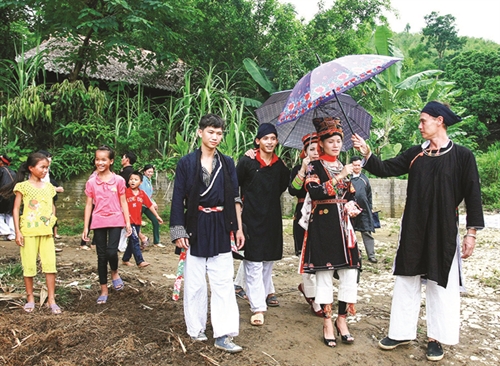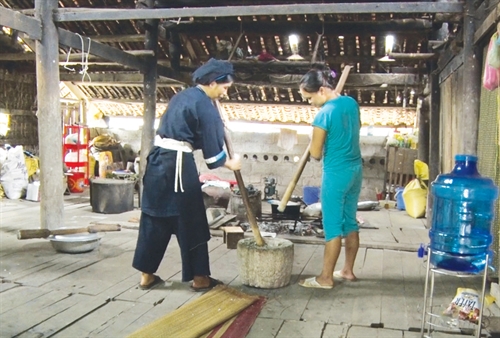Ta Thi Tam, M.A[1]. and Nguyen Minh Tung, B.A.[2]
The Pa Then, a Hmong-Dao language group, resides in lower districts of the northern mountainous provinces of Ha Giang and Tuyen Quang. Pa Then group has eight main family names, including Sinh, Phu, Tai, Lu, Tau, Lan, Van and Hung.
Pa Then people believe in polytheism and worship ancestors. Every family has an ancestral altar set up in the middle compartment - the most solemn place of the house, and another altar erected next to but below the ancestral altar to the left for family members who die before reaching the age of 36.
The Pa Then lives mainly on agriculture and believes that it is supernatural forces that dominate and decide on all farming activities as well as crop yields. Hence, the group holds rituals for different production steps, from farmland selection to sowing, pest ghost worshipping, praying-for-rain and new rice offering, to pray for the support of supernatural powers for bumper crops.
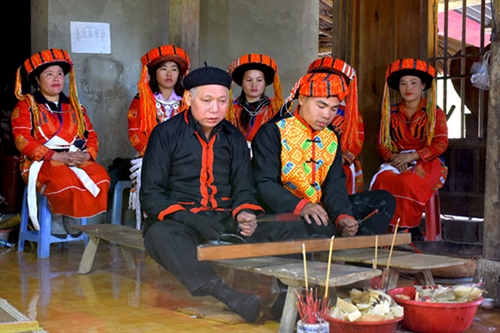 |
Pa Then people in Lam Binh district, Tuyen Quang province, wear traditional costumes during an important ritual_Photo: Internet |
Farmland selection
Unlike other ethnic groups, the Pa Then chooses land for farming based on omens they see in dreams. First, a Pa Then family head goes to the forest where exists the land plot he intends to choose. If the man meets a snake, a bird or a dead chicken or pig or if his arm or leg is cut and bleeds, or if something falls on him on the way, he will return home immediately as such things are believed to bring bad luck to the family. Arriving to the land plot, the family head uses a crooked knife to cut off a small tree strip there implying that the land is occupied. Then he returns home and waits to see what his dream will tell him that night. If in his dream, the family head sees white rice or smokes or blinks and sheds tears, he has to select another land plot as these omens are believed to be bad ones sent from ancestors to warn the family head about bad fortune in case such land plot is chosen. However, if in his dream, the family head sees a golden cow or flooding or catches a lot of small tilapia, the land plot is believed to bring bumper crops.
Sowing ritual
Pa Then people often choose a good day in the fifth lunar month to prick holes in the ground for sowing. The sowing day must neither coincide with death anniversaries of family members nor fall into the days of the rat, the tiger and the cat according to the Pa Then calendar. They believe that there is always one bad day that must not be chosen to sow seeds in the lunar calendar. For example, in 2020, the Year of the Rat, the 11th lunar month is the month of the rat, and in that month, the ninth day is the day of the rat; hence the ninth day of the 11th lunar month of 2020 is considered a bad day in the group’s farming practice.
Offerings of the ritual include a boiled rooster, a plate of color sticky rice, a bottle of wine, a bunch of joss-sticks and three to five votive papers. Standing in front of the offering tray, the family head or an invited village sorcerer puts some burning joss-sticks on the family’s land plot and prays for support from the gods of land and forest for bumper crops. After burning the votive papers, the family head and members prick holes to sow seeds on two or three square meters of the plot. After completing this formality, they share the offerings right on the field and the work is finished the next day.
Pest ghost worshipping ritual
In order to keep pests away from their crops, Pa Then people cut a branch of a herbal tree, called con loong ca, whose trunks and leaves are similar to those of trees of the ginger family, and plant it on their fields. In case such tip does not work, a sorcerer will be invited to conduct a pest ghost worshipping rite, called i po le. The host family prepares a tray of offerings with a boiled rooster, a bottle of wine, a bowl of rice, a bunch of joss-sticks and three to five votive papers. In this ritual, the sorcerer must try to find out the ghost that has released pests into the field. After identifying such ghost, the sorcerer invites it to return to the field and begs it to recall pests. The sorcerer concurrently prays the gods of the land and sun, the highest god in the heaven, called po di pa, for witnessing the rite. Several days later, if pests are controlled, the family will conduct another ritual to thank the pest ghost.
Praying-for-rain ritual
Whenever panicles are going to emerge from rice stems but the weather stays dry and sees no rain, Pa Then people invite a experienced sorcerer, called Tao, to conduct a ceremony to pray for rain on behalf of all villagers. Villagers will prepare offerings for the ritual, including a boiled chicken, a bottle of wine, a bowl of rice and some votive papers. During the ritual, Pa Then men strip bamboo bars to make the sounds of rain while women wade into streams and walk in soak clothes to the village. Two or three days after the formality, rain comes and the village conducts another rite to thank the Jade Emperor for the rain.
Sometimes, the Pa Then irritate Long Vuong (the Dragon King), the god in charge of making rains, by capturing crabs or turtles, the animals considered Long Vuong’s representatives. Pa Then people believe that if Long Vuong grows angry, the earth will be poured with rains.
New rice ritual
The Pa Then used to hold the new rice ceremony once a year on the 27th of the ninth lunar month. Nowadays, the rite, called no xi, is held on the day of the pig in the ninth lunar month, the first day of the harvest time of the winter crop. No xi is a chance for a family to offer new rice to its ancestors and thank the latter for the good harvest. In this rite, every Pa Then family prepares two trays of offering with each comprising an indispensable dish of fried or grilled fish, a boiled rooster, five bowls of rice cooked from newly harvested rice or five steamed rice ears, in case the family’s rice plants have not ripened, one bottle of wine, and some votive papers.
After the praying ritual, the family head feeds his dogs, cats and pigs with rice and shares the remaining to other family members. The tradition originated from the group’s legend which said that long time ago, after a cataclysm, there were no creatures and no food for people. There was a family with a dog, a cat and a pig. To help people get out of starvation, they discussed how to steal rice seeds from the heaven. The dog was sent to swim across a large ocean to the heaven as the Pa Then believes that the earth is near the heaven. When the dog arrived at the heaven’s barn, there was nothing to carry rice home so it drowned itself into the water, rolled over the rice barn for several times and ran home. Unfortunately, rice seeds were swept away when it was swimming across the ocean, except three seeds left on its nose. But the three seeds were dropped in a small stone slot on the way home and it had to ask for the cat’s help to take the seeds out with its long paws. With those seeds, Pa Then people could develop into the rice varieties they have today.-
